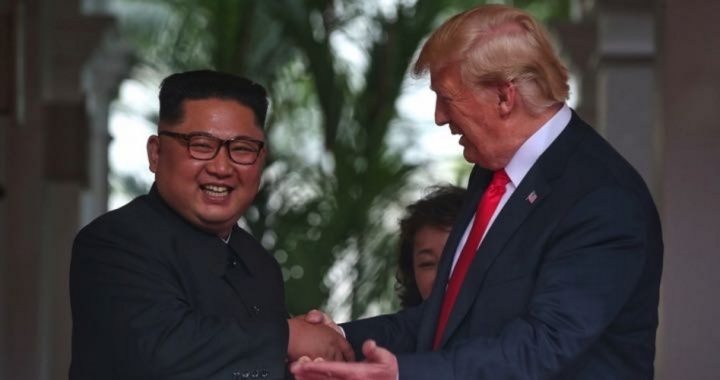
President Donald Trump’s historic summit with North Korean communist dictator Kim Jong-un could pave the way to future U.S. diplomatic recognition of North Korea and eventual trade between the two countries. However, the United States will likely lose much in the pursuit of ostensive peace and ensure both the survival of Kim Jong-un’s reign and the longevity of his tyrannical communist Workers’ Party of Korea regime.
History and Life in North Korea
Kim Jong-un is the grandson of the North’s first tyrant Kim Il-Sung, who was installed as the nation’s communist dictator by Soviet dictator Joseph Stalin shortly after Imperial Japan’s defeat in World War II.
Whereas the southern Republic of Korea flourished as an economic power with its free people enjoying a high standard of living, under a constitutional form of government, it was a totally different story for the North.
Under Kim Il-Sung’s repressive communist dictatorship and that of his son and now grandson, the people of the North have lived in abject poverty, malnourishment, and fear. Political prisoners, Christians, and those suspected of treason against the state are routinely forced to toil in brutal slave labor camps scattered throughout the country.
Only the families of a privileged few, mainly academics, scientists, military brass, and the elite of the ruling Workers’ Party — modeled after the Communist Party of the Soviet Union — live in moderate comfort insulated in the capital city of Pyongyang. Freedom of movement and travel is a luxury not known to the enslaved people of North Korea.
With the exception of those in military service and top party elite on official business, North Koreans might live their whole lives never seeing or knowing what lies beyond their local communities. Even foreign tourists are restricted to carefully orchestrated government-run tours of the country that exalt the “greatness” of the country’s late “Great Leader” Kim Il-Sung, who is revered as a god in North Korea. Even the calendar in North Korea is set by the birth of Kim-Il Sung, rather than the Gregorian calendar, which is based on the birth of Jesus Christ.
With the exception of a handful of state-sanctioned churches — one Roman Catholic, three Protestant, and one Russian Orthodox — that exist merely as a façade for tourists and the outside world, North Korea is virtually void of all vestiges of Christianity.
According to World Help, a humanitarian Christian non-profit organization, “If they are found with a Bible, North Korean Christians face years of imprisonment in labor camps where they are tortured and beaten daily. Bibles are confiscated and destroyed, and most believers have never seen more than a page of God’s Word.”
North Korea is a repressive communist state that glorifies a culture of war over the well-being and prosperity of its own people. With North Korea’s pursuit of nuclear weapons and intercontinental ballistic missiles capable of carrying such ordnance to targets on the U.S. mainland, the West is on a quest to denuclearize the peninsula at almost any cost, despite its unsavory characteristics.
“It’s Alive” — From Communist China to North Korea
President Trump’s assertive foreign policy may have contributed to bringing North Korea to the bargaining table. However, it is more likely that Kim Jong-un’s greatest motivation for peace is his own personal survival and comfort, which at his young age can only be ensured through long-term peace and access to foreign capital. Access to foreign capital, either in the form of foreign aid, loans, or credit is essential to building up his nation’s economy, as well as his own fortune and prestige domestically, or so he hopes.
Although, President Trump met with North Korea’s leader, the United States has never extended official diplomatic recognition to North Korea, meaning that the United States does not have an embassy in Pyongyang or a consulate anywhere else in North Korea. Nor does the United States have any trade relations with North Korea. However, that could all change in a few years or decades.
If this sounds premature, recall President Richard Nixon’s historic visit to mainland Communist China, where he met for the first time with Chinese Communist dictator Mao Tse-Tung in 1972. It was only seven years later, in 1979, when the then-Carter administration gave U.S. diplomatic recognition to Communist China.
In 1984, the Reagan administration reopened its consulate in Beijing. In the 1990s, the U.S. Congress repeatedly gave Communist China “most favored nation” status, with the support of Presidents George H. W. Bush and Bill Clinton. And on December 27, 2001, with the backing of then-President George W. Bush, the United States made China’s “most favored nation” status permanent.
Step by step, U.S. administrations have gradually brought Communist China out from the backwoods of agrarianism to the forefront as both an economic giant and military world power. Now the Communist Party of China and the People’s Liberation Army, which it directly controls, is more powerful than ever before, defying and challenging U.S. interests in the Asia-Pacific. It is the classic horror tale of Dr. Frankenstein and his monster, only in real life with the United States playing the role of the mad scientist and Communist China the monster. The question now is, will President Trump and the U.S. foreign policy establishment do the same again with North Korea?
Larry McDonald’s Foresight
Regarding Communist China, The John Birch Society’s second chairman, the late U.S. Congressman Larry McDonald, warned against recognizing Communist China and how it could hurt our domestic textile industry.
The Spring 1979 issue of The Northwest Georgian — Congressman Larry McDonald’s newsletter — mentioned a then-45-year-old textile worker named Bill M, residing in Georgia’s Seventh Congressional District, which McDonald represented, and his fear of how then-President Carter’s recognition of Communist China could affect his job. Congressman McDonald was quoted in the article as saying:
At this time the only items of value which Red China is able to export in significant quantities are textiles and textile products. Because it is a totalitarian country, Red China forces her workers to labor for slave wages for only a few pennies a day. Naturally, the products she wants to export will be exceedingly cheap, especially textiles.
Congressman McDonald’s economic predictions were right on the money. In 2013, CNBC reported: “More than 97 percent of apparel and 98 percent of shoes sold in the U.S. are made overseas,” according to the American Apparel & Footwear Association. During the 1960s, roughly 95 percent of apparel worn in the United States was made domestically.
This virtual evisceration of the U.S. textile industry is the direct result of Presidents Nixon and Carter opening dialogue and normalizing diplomatic relations with China. Furthermore, as Congressman McDonald pointed out in his newsletter, Communist China had no significant supply of U.S. dollars to purchase U.S. goods. So in order for the trade to work both ways, the United States needed to give Communist China the capital to buy U.S. goods. McDonald said:
Before it can buy any U.S. goods, equipment or services, it must obtain grants, “loans” or “credits” from the United States. The taxpayer, of course, will be forced to bear the burden of financing or guaranteeing such arrangements. I fail to see the benefits of the taxpayer having to give his money to Red China which in turn, will use it to build modern factories — thereby throwing U.S. workers out of their jobs.
So in comparing North Korea to China, will future U.S. administrations secure loan and credits backed by our taxpayers to prop up North Korea’s economy?
Like Communist China of the 1970s, North Korea also makes textile products. However, most of what it makes and sells abroad are coal briquettes, which are compressed bricks of coal dust.
Will the U.S. coal industry bite the dust owing to North Korea’s competition using inexpensive slave labor? Or how about the remnant shreds of the U.S. textile industry? How about even the U.S. auto industry?
While the United States may soon officially end the military war with North Korea, it may also soon find itself in the midst of a losing trade war with North Korea, just as it has been and still is with Communist China.
Any talk of denuclearization and peace on the Korean peninsula should be approached with extreme caution and suspicion, in light of our history with Communist China and what North Korea hopes to gain.
Photo of Kim Jong-un and Donald Trump: AP Images




